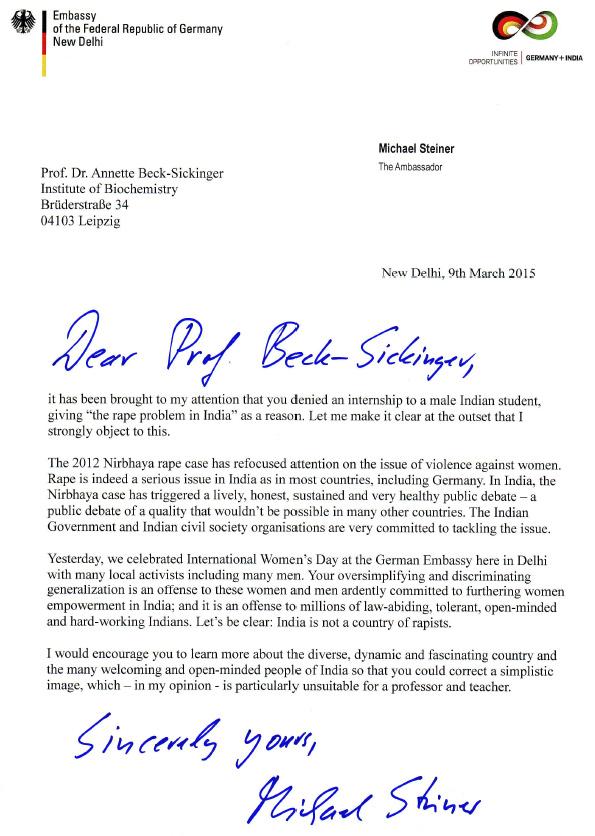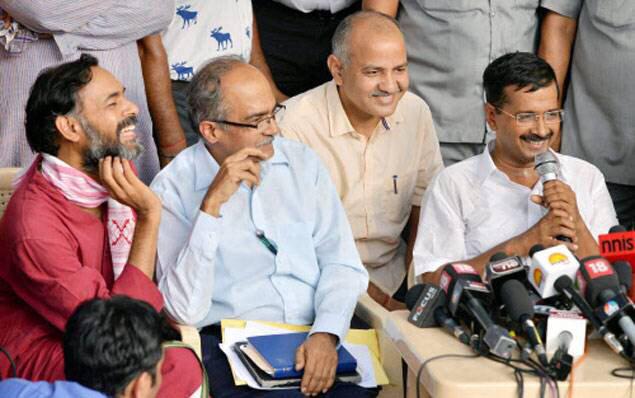The story of the German professor who denied internship to an Indian student went viral yesterday.
According to the question posted by his friend on Quora the student was given the pretext of 'rape problem' in India by the professor.
In further interactions, Professor Annette G. Beck-Sickinger, Leipzig University reiterated her stand, citing reports of 'multi-rape crimes'.
Kindly enough German Ambassador to India, Micahel Steiner shot a letter to her in the right earnest, expressing his difference of opinion, and clearing the misconceptions, where he describes Indians as open-minded, law-abiding, tolerant, open-minded and hard working.

This was followed by a post on the website of German Embassy to India saying that the Professor had apologised. " I have made a mistake. I sincerely apologise to everyone whose feelings I have hurt ", announced Prof. Beck-Sickinger.
It looked like the matter had closed with the apology. The Professor realised her mistake and apologised, and we should move on. However the press release by the Leipzig University tells a different story. It says
The professor recently turned down the student’s email application for an internship because no openings were available. The student did not accept her reasoning and involved her in a discussion about the social conditions in Germany and India. In her response, she mentioned the problem of women in India being raped.
It also says
Professor Beck-Sickinger stated: "I never wrote the mail in this way, it has been put together from individual segments taken from different mails."
The President of University of Leipzig stated
"From the point of view of the University she has followed the correct and suitable path to avoid misunderstandings and to express her apologies."
Is this the whole truth or there is more to the story? Why was the whole apology not made public, and only parts out of context? Is this a one-off example of her conduct, or there could be a pattern?
According to a story published in The News Minute, by Dhanya Rajendran, one more student came forward citing a similar email sent to him by the same Professor in reply to his PhD application. He chose to remain anonymous but gave a screenshot as proof.
Dear Mr…..,
Thanks a lot for your application.
Unfortunately, I do no longer accept any male Indian guests, trainees, doctoral students, or post docs due to the severe rape problem in India.
I cannot support a society which is not able to respect females in any aspect. I think cultured people cannot close their eyes.
According to him, this was the only email transaction he had with the Professor, unlike the current one in question, where the University claims that there were many emails exchanged after denial of internship, the student engaged her in a conversation and implies that Prof. Beck-Sickinger was compelled to make such arguments.
The above example though falsifies such claims.
The matter should be taken up by our MEA (Ministry of External Affairs) as well as the HRD (Human Resource Development) Ministry. Every year thousands of students apply for admission in variious educational programmes in Germany.
In response to a question by a student regarding the money to be shown in one's account, DAAD (http://www.daaddelhi.org/ ) answered "A student’s blocked account ("Sperrkonto") in Germany in the name of the applicant showing a minimum balance of Euro 8.040, and the remark that the account holder can dispose of a monthly amount of EURO 670, is necessary, the alternatives being a scholarship or a formal letter of sponsorship from a sponsor living in Germany. "
The interest rate on a student loan in India is apparently higher than that on a car loan. There is a lot of investment involved when a student decides to study abroad, monetary as well as psychological and emotional. A student has to adjust in the new environment, learn the norms and fit in.
As a nation, India brings a considerable revenue to many countries around the world in terms of educational spending. While it cannot be denied that most countries, including Germany, provide a friendly and hospitable atmosphere for the students, there could be issues specific to countries which need to be addressed.
It is the duty of the Indian Government to look into the matter and follow it up. The response from the University, as well as Prof. Beck-Sickinger has been less than satisfying, especially in light of new reports. It is unlikely that the students would take any strong steps, considering their vulnerable position. However the Government needs to step up its act, even if means taking stern action against such incidents ,and make an official statement. This could give reassurance to the aspiring students applying overseas, as well as their families.
